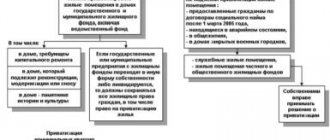Due to the peculiarities of Russian legislation, many people wonder how to privatize an apartment without the consent of other residents living in it. In this text we will figure out whether it is possible to resolve the issue and how it will be possible to avoid refusal of privatization.
- Whose consent should not be asked?
- How to privatize an apartment without the consent of registered residents through housing division
- How to privatize a municipal apartment without the consent of residents through the court
- How can you privatize an apartment without the consent of the residents based on housing and communal services bills?
- Legal assistance during privatization
Whose consent should not be asked?
Before moving on to the issue of privatization, it is necessary to understand who exactly has the right to decide whether the apartment will be privatized or whether the social tenancy agreement will remain. Since the law indicates the need to ask the consent of all persons living in a separate living space, at first glance no uncertainty should arise. However, it is not. There is no need to ask consent for privatization from the following “roommates”:
- persons who have already exercised their right to privatize an apartment or other residential premises once;
- issued by a court decision (provided that the decision has entered into legal force), and it does not matter whether they were deregistered or have not yet done so;
- persons who have temporarily registered in an apartment - temporary registration is not a pretext for participation in the privatization of housing;
- unregistered residents;
- minors, since they unconditionally take part in privatization, therefore their consent is not discussed.
After determining who exactly should express consent, the initiator of the process should try to resolve the issue peacefully. In particular, an attempt should be made to persuade other residents. And only if they do not agree, try to implement their plan for privatization of housing in a different way.
Failure Cases
Privatization is a privilege that any citizen can take advantage of. However, it happens when a group of residents decides to become owners, but they are rejected.
Reasons for refusal (premises status):
- dormitory;
- premises related to official (issued by the service) housing;
- emergency housing;
- apartment located inside a guarded military camp;
- The housing stock is subordinate to social security institutions.
Other reasons for refusal:
- illegal redevelopment;
- unpaid services (debts);
- documents are expired;
- documents are forged;
- The administration of a city or other locality does not itself have rights to this property.
However, some reasons for refusal can be eliminated. Close debts by paying them, update overdue documents. Illegal redevelopment obliges residents to pay a fine imposed by Rosreestr. Fake documents are a more serious problem. Litigation is possible.
How to privatize an apartment without the consent of registered residents through housing division
It is worth understanding that an apartment cannot be in municipal and private ownership at the same time. Therefore, there is no need to try to somehow privatize only part of the apartment. Instead, you can make an attempt to turn the apartment into a communal apartment in order to conclude a separate social rental agreement for your room and then privatize it (look for details in this text).
But as legal practice shows, municipal authorities do not agree to split up property. And even more so, it will not be possible to divide the apartment into shares if there is no technical ability to organize separate entrances, kitchens, bathrooms, or the apartment is completely one-room. Consequently, the answer to the question of how to privatize part of an apartment without the consent of the residents will be negative.
Therefore, it is much easier to do it in a different way - to forcefully privatize the apartment through the court. But this is a difficult and long path, which is almost impossible to overcome without the professional help of a lawyer.
How to highlight?
There are two options to do this:
- with registered citizens on the allocation of a share in kind . The process is carried out with the consent of the registered persons in writing. The agreement is certified by a notary. After this, BTI engineers draw up a plan and technical passport of the apartment, on which the privatized share is clearly highlighted.
- If it is impossible to obtain voluntary consent to privatize the apartment of the residents, you will have to seek the allocation of a part in the form of a room through the court . Filing a claim requires the appointment of a forensic construction expert. The purpose of the examination is to check the possibility of allocating a share in kind, determining the total cost of the apartment and the price of the allocated share.
After the examination, a lawsuit is filed with a request to allocate a share in the common real estate.
The following documents are attached to the statement of claim:
- registered passports;
- extract from the apartment card about those registered;
- warrant and lease agreement;
- certificate of the applicant’s non-participation in privatization;
- technical passport and floor plan.
In fact, the same package of documents is submitted to the court as for the privatization of an apartment. In addition to the above, information about changes of surnames and certificates of place of residence may be required if citizens were checked out of the apartment, as well as other documents and certificates.
The process of allocating a share of an apartment in kind is very complicated and requires approval from many authorities . First of all, it is necessary to obtain the consent of local governments, and they rarely immediately agree to such actions.
Can I privatize an apartment without the consent of those registered? Perhaps if you use our advice.
How to privatize a municipal apartment without the consent of residents through the court
For judicial privatization of an apartment, the applicant must have compelling reasons, as well as confirmation of the legality of his demands. That is, the court will decide the issue of forced privatization of municipal housing only if the situation has one of the following signs.
- A “refusenik” does not live in an apartment for a long time without a good reason. That is, the person whose consent must be obtained for privatization does not actually live in the apartment. But at the same time, he does not check out of the living space, thereby depriving other tenants of exercising their right to privatization.
- The “refusenik” does not pay his share of utility bills. One of the important conditions of a social tenancy agreement is the timely payment of utilities. A person who violates a contract requirement is forcibly discharged by the court, and the contract with him (if concluded) is terminated.
Consequently, in order to answer the question of how to privatize an apartment without the consent of some residents, the interested party will either have to prove that people do not live in the house, or that they do not pay utility bills.
Another important aspect of this event is the agreement in principle of other persons occupying the living space. But even if there is none, all is not lost. Many are able to justify their right to demand privatization precisely through payments for housing and communal services.
Options for resolving the issue
The main reasons for the disagreement of some of the residents with privatization are most often:
- unwillingness to pay property taxes annually;
- independently monitor the technical condition of the premises and communications;
- fear of “staying on the street” if relations between relatives are strained;
- the inability to subsequently privatize another apartment (with a larger area or, for example, amenities);
- lack of time to participate in privatization
- simply an unwillingness to make concessions to other residents due to hostile relationships or unwillingness to subsequently exchange an apartment (for example, an ex-husband does not want to leave his ex-wife and child, etc.).
If you still have a desire to privatize municipal housing, then there are only three ways:
- Voluntary agreement . You will have to come to an agreement with each of the residents. This is the least expensive method, but not always effective. However, it is worth remembering that you cannot resort to illegal methods of persuasion, because your actions may be qualified under one or another article of the Criminal Code of the Russian Federation.
- By court decision. Only this authority is authorized to authorize privatization without the consent of some residents. For example, if the whereabouts of one of the relatives is unknown, then an application is submitted to the court to declare the person missing or dead. Or you can try to discharge the person from the municipal apartment. We have already talked about the reasons for this and how to do this. The court verdict will serve as a permitting document for privatization without consent.
- Privatization of part of the housing. This is only possible if there is an option to allocate a share in kind. You can learn about this procedure here.
Example. Smirnova I.L. lived in a municipal apartment. with two sons Sergei and Leonid. The eldest (Sergey) has not lived with his mother and brother since 2010; he went to work in another city, but was not deregistered. In 2020, Smirnova decided to privatize the apartment. Leonid did not object, but Sergei refused to come for this procedure. No amount of persuasion or requests to issue a notarial refusal had any effect on him.
Read more: When can you get cash on delivery?
Then Smirnova filed a lawsuit to recognize her eldest son as having lost the right of ownership to use the housing. The court satisfied her demands, since Smirnov S. really did not live in the apartment for a long time, and this is the basis for deregistration. With the court decision, Smirnova turned to the Department of Internal Affairs of the Ministry of Internal Affairs of the Russian Federation and discharged her eldest son. Then, in the usual manner, she filed an application for privatization with the municipality, and the apartment was registered as her property, as well as the property of her youngest son (Leonid) in equal shares.
How can you privatize an apartment without the consent of the residents based on housing and communal services bills?
How does the process of paying for utilities work? In most cases, one person pays, and he also keeps the receipts. Or payment occurs through a bank, but through the card of a specific person. Therefore, the court can be provided with proof of payment of bills by the interested party - receipts or bank statements. At the same time, state that all utility costs are borne by the plaintiff.
Defendants will have to prove their participation in paying the bills. And it is unlikely to be possible to confirm the transfer of money (even if it actually happened). In particular, the defendant will have to either provide photographic and video materials, or witness statements, or bank transfers marked “for housing and communal services accounts.”
But there is no trend in court decisions, so such a dispute can be lost. But if you manage to win it, then in the end:
- The municipality will not dare refuse privatization (read how to act in case of refusal here);
- the remaining persons will be discharged from the apartment and not allowed to privatize.
Legal assistance during privatization
Without special legal knowledge, it will not be possible to win such a process. Moreover, simply going to court is not always justified. Therefore, you should seek help from a professional lawyer. The specialist will provide the following assistance:
- will determine the possibility of privatization, including analyzing the rights of the interested party;
- analyze the situation and assess the chances of success;
- will collect the necessary evidence in the case, documents and other papers, or tell you where to get them;
- draw up (or help to do so) a statement of claim to the court;
- represent the client's interests at trial;
- will monitor the execution of the court decision.
Due to frequent updates to legislation and the legal uniqueness of each situation, we recommend obtaining a free telephone consultation with a lawyer. You can ask your question by calling the hotline number 8 (800) 555-40-36 or write it in the form below.
Cost of privatization
The procedure itself is free of charge, but you will need to pay for many certificates and obtain information. On average, excluding urgency, you will need about 2-3 thousand rubles, including notary services. If privatization should be carried out as soon as possible, then it is recommended to resort to the services of specialists, where the price level depends on the complexity of the issue.
When privatizing an apartment without the consent of registered residents, legal costs may be required for the trial. The statute of limitations on privatization issues is currently three years, so if there are any objections to the procedure, all interested parties can file an application with the court to review the allocated property.
Privatization issues have many serious nuances that can only be resolved legally with the participation of an experienced lawyer.
Privatization of an apartment without the consent of one of those registered in the apartment
Didn't find the answer to your question? Find out how to solve exactly your problem - call right now:
Consultation is free!
The use of housing owned by the municipality has a number of advantages, which is reflected in exemption from additional tax obligations, the need to use your own funds for home repairs, protection from fraudulent activities, etc.
An important place in the topic of municipal housing is given to its privatization, which implies the transfer of ownership rights from the municipality to residents. The transfer of rights to housing allows owners to dispose of their own square meters, donate, bequeath and register in an apartment, rent it out or exchange it.
Legislative norms define a strictly established procedure for the privatization of housing belonging to the municipality. To carry out this procedure, the consent of each resident who has a residence permit in a municipal apartment is required.









